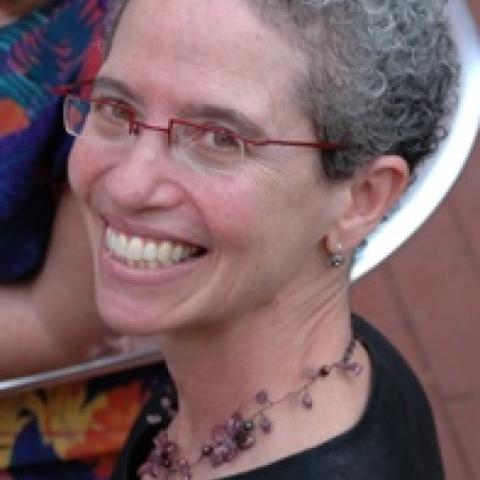
Ellen Contini-Morava
Ph.D. Columbia University 1983
Specialties
Meanings and discourse functions of grammatical forms; pragmatics; linguistic theory and method; African linguistics (especially Bantu); noun classification.
I had an early childhood fantasy that my unique brain wave configuration made me the only person on Earth who would be able to communicate with the space aliens I hoped would show up. Later I became interested in human languages, but I resisted learning my father’s native language, Italian, until our family moved to Somalia when I was 12 and it turned out that the only middle school in Mogadishu was Italian. There I also studied Latin and Arabic, and for fun I attended Russian classes that were run by the Soviet embassy for Somalis en route to study in the USSR. I didn’t learn Somali, though, which was not written then and not formally taught. This I felt as an unpaid debt that followed me back to the U.S., which led to my later focus on African languages and linguistics.
According to Franz Boas, anthropology’s intellectual forebear, each language is a principle of classification, and its grammar encodes only a subset of the infinite number of meanings that people can imagine wanting to communicate. Two questions that have inspired most of my research are: (1) what are the meanings encoded by the grammatical categories of particular languages? and (2) how do people employ these sparse and abstract meanings to convey an infinitely varied set of messages in actual discourse?
My early work was on the meanings expressed by verb tenses and “aspects” (forms indicating ongoing or completed action, as opposed to location in time) in Swahili. I was intrigued by the fact that Swahili, like other Bantu languages, had a different set of tenses and aspects in the negative from those used in the affirmative. In my first book I discuss how the negative forms express meanings having to do with defeated expectations, i.e. they say more about what might have been than about what actually happened. Later I turned to the system of noun classification for which Bantu languages are famous. These resemble “grammatical genders” such as those found in French or Spanish, except that there are a dozen or more “genders” instead of just two, and the basis for classification has nothing to do with sex/gender. In this work I have been interested in both why a noun is assigned to one class rather than another (why are hippos, diminutives, and names of languages put into the same class in Swahili?), and what is the communicative function of noun classification in general. After all, languages like Turkish make do without noun classes, modern English has abandoned them, and English speakers find it an illogical burden to learn the genders of nouns in French or German.
Noun classes are part of a broader linguistic phenomenon of grammatical classification that shows up in languages as disparate as Chinese and Menominee. In recent work I have explored the cognitive and communicative functions of these systems in a cross-linguistic study conducted jointly with Marcin Kilarski of Adam Mickiewicz University in Poland, and I am currently engaged in a collaborative project with my U.Va. Anthropology colleague Eve Danziger on determiners and noun classifiers in the Mopan Maya language of Belize.
Selected Publications
2025 – Noun Class “Concord” as Communication (video). Emerging Works in Diverian Linguistics 1. New York, NY: Manifold @CUNY
2022 - Challenging ‘Definite Article’ as a Comparative Concept: the Case of Mopan Maya. (With Eve Danziger). Language Sciences 91. Doi: https://doi.org/10.1016/j.langsci.2022.101461
2020 - Referential Anchoring without a Definite Article: the Case of Mopan (Mayan). (With Eve Danziger). In Balogh, Kata, Anja Latrouite & Robert D. Van Valin‚ Jr. (eds.), Nominal Anchoring: specificity, definiteness and article systems across languages (Topics at the Grammar-Discourse Interface 5). Berlin: Language Science Press, 81-113. Doi: http://doi.org/10.5281/zenodo.4049683
2018 - Non-Canonical gender in Mopan Maya. (With Eve Danziger). In Sebastian Fedden, Jenny Audring, and Greville Corbett (eds.), Non-Canonical Gender Systems. Oxford University Press, 129-146. Doi: https://doi.org/10.1093/oso/9780198795438.003.0006
2013a - Functions of Nominal Classification. (with Marcin Kilarski) Language Sciences 40: 263-299. Doi: https://doi.org/10.1016/j.langsci.2013.03.002
2013b - Introducing Referents in Mopan Maya. (With Eve Danziger.) Proceedings of the 2012 Belize Archaeology and Anthropology Symposium, Institute for Social and Cultural Research, Belmopan, Belize.
2012 - The message in the navel: (ir)realis and negation in Swahili. Language Sciences 34 (2): 200-215. Doi: https://doi.org/10.1016/j.langsci.2011.08.005
2008 - Human relationship terms, discourse prominence, and asymmetrical animacy in Swahili. Journal of African Languages and Linguistics 29.2:127-171. Doi: https://doi.org/10.1515/JALL.2008.008
2007 - Swahili Morphology. In: Alan Kaye (ed.), Morphologies of Asia and Africa. Winona Lake, IN: Eisenbrauns, pp. 1129-1158.
2006 - The Difference Between Zero and Nothing: Swahili Noun Class Prefixes 5 and 9/10. In Joseph Davis, Radmila Gorup, and Nancy Stern (eds.), Advances in Functional Linguistics: Columbia School Beyond its Origins. Amsterdam/Philadelphia: John Benjamins, pp. 211-222. Doi: https://doi.org/10.1075/sfsl.57.16con?locatt=mode:legacy
2004 - Cognitive and Communicative Approaches to Linguistic Analysis. (Ed. with Robert S. Kirsner and Betsy Rodriguez-Bachiller). Amsterdam/Philadelphia: John Benjamins. Doi: https://doi.org/10.1075/sfsl.51?locatt=mode:legacy
2002 - (What) Do Noun Class Markers Mean? In Wallis Reid, Ricardo Otheguy, and Nancy Stern (eds.), Signal, Meaning, and Message: Perspectives on Sign-Based Linguistics. Amsterdam/Philadelphia: John Benjamins, pp. 3-64. Doi: https://doi.org/10.1075/sfsl.48.04con?locatt=mode:legacy
2000 - Between Grammar and Lexicon. (With Yishai Tobin). Amsterdam/Philadelphia: John Benjamins. Doi: https://doi.org/10.1075/cilt.183?locatt=mode:legacy
1997 - Swahili Phonology. In Alan Kaye and Peter Daniels (eds.), Phonologies of Asia and Africa. Winona Lake, IN: Eisenbrauns.
1995 – Meaning as Explanation: Advances in Linguistic Sign Theory. (Ed. with B. S. Goldberg). Introduction: On linguistic sign theory. Berlin: Mouton de Gruyter. Chapter doi: https://doi.org/10.1515/9783110907575.1
1994 - Noun Classification in Swahili. Publications of the Institute for Advanced Technology in the Humanities, University of Virginia. Research Reports, Second Series.
1991 - Deictic Explicitness and Event Continuity in Swahili Discourse. Lingua 83.4: 277-318.